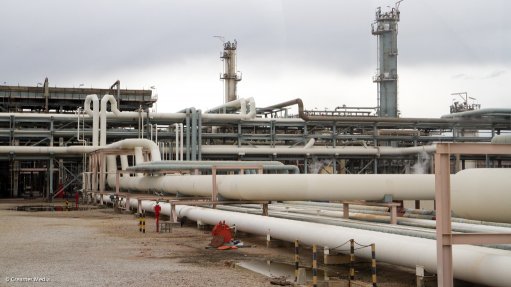
South Africa’s national oil company PetroSA produced 14% less refined product in 2013/14 than budgeted, owing to diminishing gas feedstock. The State-owned group also warned that that inadequate feedstock would remain a constraint on its future performance.
The company produces 5.8-million barrels during the year at its Mossel Bay gas-to-liquids (GTL) refinery, which had a nameplate capacity of around 15-million barrels.
CEO Nosizwe Nokwe-Macamo told lawmakers in Cape Town on Tuesday that PetroSA had embarked on various initiatives aimed at sustaining the GTL refinery, as well as the viability of the company.
“These include the five-well drilling programme called Project Ikhwezi, the Asset Development Plan, [which is] an initiative to look at alternatives to sustain the GTL refinery, and a project to import liquefied natural gas (LNG) to South Africa,” she said.
The company had been seriously studying an LNG import facility to shore up gas supplies, as well as to potentially supply gas to Eskom’s Gourikwa open cycle gas turbine peaking power plant, in Mossel Bay, which was currently fuelled using diesel.
But PetroSA announced in August that it had decided not to pursue a floating LNG import terminal in Mossel bay, following a study that found the proposed sites to be “technically and commercially challenging”. The company was currently evaluating various other locations, as well as gas-supply alternatives.
Nokwe-Macamo revealed that the group had also embarked on a cost optimisation initiative that would seek to realise R1-billion-a-year in permanent cost savings.
The company reported a 12% increase in revenue to R21.2-billion during the year, as well as a R2.2-billion operating profit.
But it reported a net loss of R1.65-billion, owing to a R3.4-billion impairment charge against its onshore and offshore assets.
“PetroSA has had a trying year with the main focus being on the sustainability of the refinery, given the declining gas feedstock. The sustainability of our refinery is critical as it not only contributes to the sustainability of our business but also to our total revenue,” Nokwe-Macamo said.